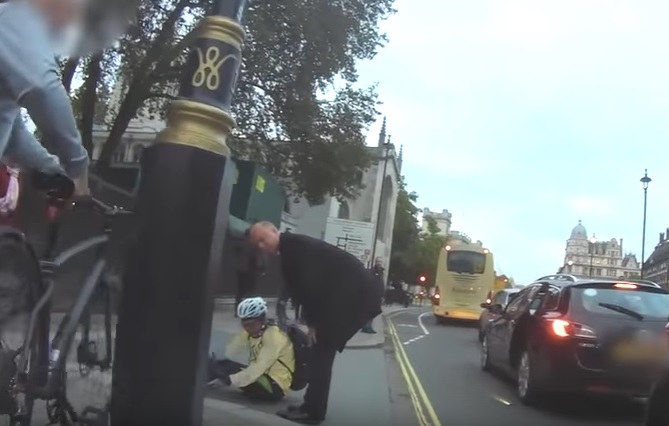UK transport secretary, who knocked over cyclist with car door, claims they're not 'road users'
Grayling, who was filmed opening car onto a passing cyclist, appears to be ignorant of UK road law.
Chris Grayling, the transport secretary who flattened a cyclist with his ministerial car door, has today (12 January) claimed, incorrectly, that cyclists are not fully recognised road users.
In October 2016, Grayling was filmed knocking cyclist Jaiqi Liu to the ground as he got out of a car in slow moving traffic outside the Palace of Westminster. Liu later complained of back, leg and head pain, and the wheels and brakes of his bike were also left damaged.
On 12 January of this year, Grayling told the House of Commons: "Cyclists are the users of cycle lanes and there's a road alongside. The motorists are the road users and the users of the road – it's fairly straight forward."
Bicycles have been recognised as bona fide carriages on UK roads since 1888. And there was no cycle lane available to Liu at the spot where Grayling sent him flying.
Simon Munk from the London Cycling Campaign said: "Whether in lanes, tracks or on the road, cyclists are every bit as much road users as pedestrians, motorcyclists, horse riders and drivers. Grayling needs to urgently skill up on cycling and embrace it as a solution to our transport issues, not the problem."
Banker Liu, who was wearing high-visibility clothing when Grayling hit him, reportedly said the minister had accused him of cycling too fast in the immediate aftermath of the collision.
Grayling has endured a somewhat tumultuous winter as Secretary of State for Transport . In addition to knocking Liu from his bike, he has been at the centre of bitter disputes between Southern rail and unions. In December, a letter from Grayling, to former mayor Boris Johnson, was leaked in which he explained that he was reluctant to hand over the Southern franchise to Transport for London in case it fell into "the clutches of a Labour Mayor".
The transport secretary was being quizzed by Labour MP Daniel Zeichner about comments he made in an interview with the Evening Standard in 2016 last year, in which he said: "I don't think all the cycle lanes in London have been designed as well as they should have been. There are places where they perhaps cause too much of a problem for road users and they could have been designed in a smarter way."


© Copyright IBTimes 2024. All rights reserved.





